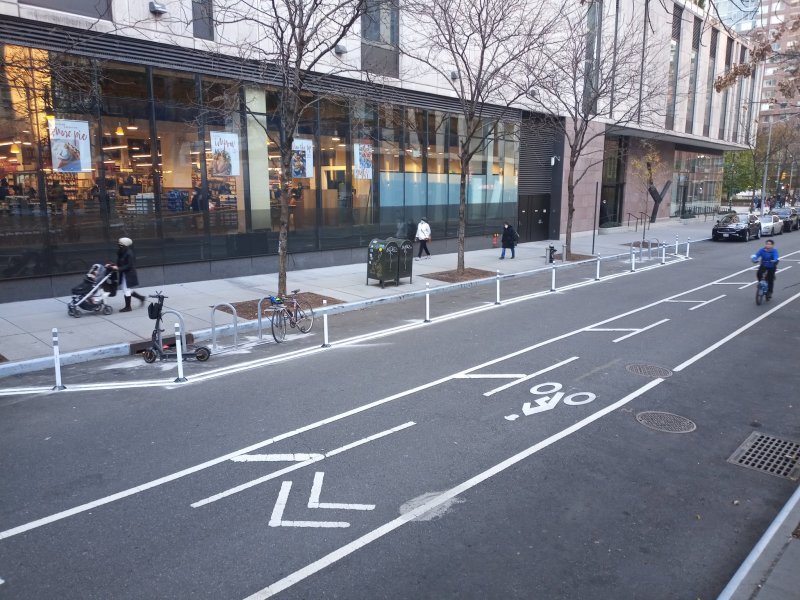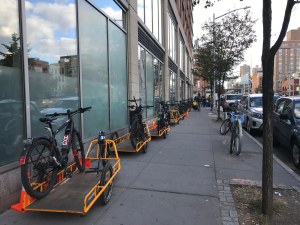DOT Installs Lower Manhattan Cargo Bike Zone Despite Community Board ‘Nay’

This is happening.
The Department of Transportation informed Manhattan Community Board 1 that it would install a cargo bike corral next to a Whole Foods in Tribeca, defying the board’s executive committee, which voted against the plan in October. The corral, which takes about 100 feet of curbside space on Warren Street between West and Greenwich streets, is around the corner from the supermarket and would provide space for cargo bike riders to load up, plus six bike rack sleds for public use.
Rather than showing up and pitching the idea like the agency did last month, Manhattan Borough Commissioner Ed Pincar sent CB1 a letter on Tuesday that laid out the terms of the new loading zone, which will run as a six-month pilot. The design is basically unchanged from the same proposal that the board committee previously rejected (though the DOT did cut off 20 feet of the total length).

Pincar wrote the DOT will monitor the area for compliance around things like Whole Foods allowing the public to use the bike racks, and that it will come back to the board before making the cargo bike loading zone permanent. And, as a sop to the community, the agency will even attempt to replace the five curbside spaces that drivers believe is theirs for car storage somewhere else in the neighborhood.
The DOT move to buck the local community board in this case is crucial because the upscale grocer is the only company in New York City that is participating in the city’s cargo bike pilot program at any real scale, dispatching cargo bike deliveries from four stores around the city. And Whole Foods has promised that it would phase out the use of delivery vans at the TriBeCa store by the end of 2020, so the DOT decision makes it more likely that the grocer will be able to eliminate such trucks in the already congested and pollution-marred neighborhood (electric cargo bikes emit no pollution at the source).
And the Tribeca plan may lead to other such solutions, given that other Whole Foods locations around the city need space for their cargo bike operations instead of using sidewalk space as a staging area.
The news of the six-month pilot caused much trepidation among the well-to-do members of Community Board 1, who conjured a dark future where marauding cargo bike riders terrorized children who use the Battery Park City Ball Fields or attend P.S. 234, which is located on the corner of Warren and Greenwich. A teacher at the school suggested a child would likely die as a result of the cargo bike corral.
“I do not want to bury another child,” Francine Cornelius, a teacher at PS 234 told the board. “I do not want our community to bury another child. I am against this proposal.”
Cornelius did not explain why removing parking spaces and encouraging the safe use of cargo bikes would result in a child’s death, beyond the relative nearness of the cargo bike corral to a school entrance.
There is no record in the modern city history of a child being killed by a bicyclist. But in 2019, a 4-year-old girl was hospitalized after a cyclist collided with her in Riverside Park. In the same year, drivers killed a a 10-year-old on a bike, a 14-year-old on a bike, a a 16-year-old on a bike and a 17-year-old on a bike in separate incidents.
And at the beginning of 2020, a driver killed a 7-year-old walking to school with his mother.
Nonetheless, the de Blasio administration has not responded to requests by safe streets activists to ban cars on roadways around schools. Last year, Schools Chancellor Richard Carranza admitted he never even discussed the matter with the mayor.
